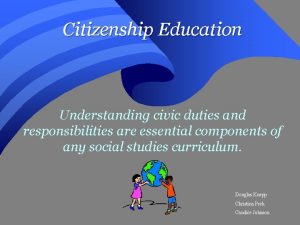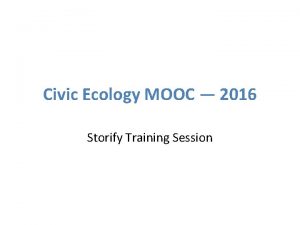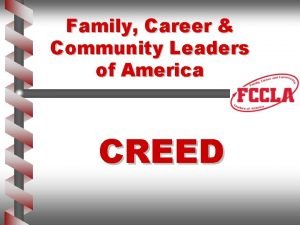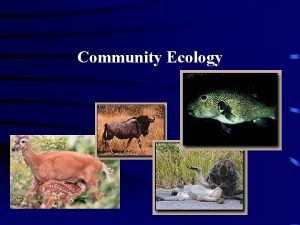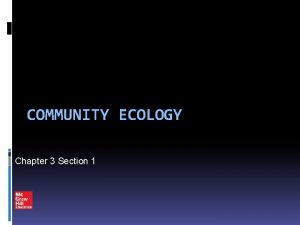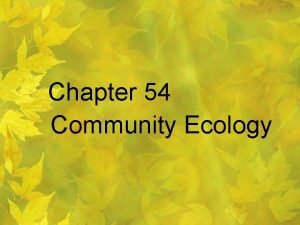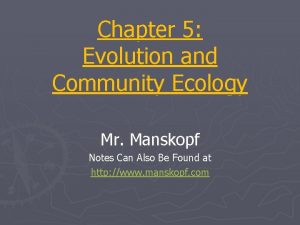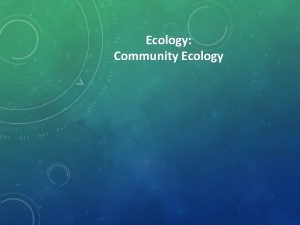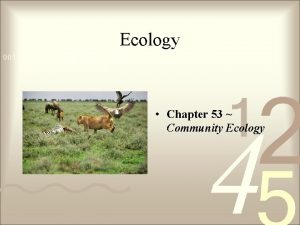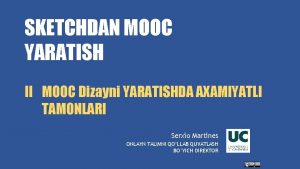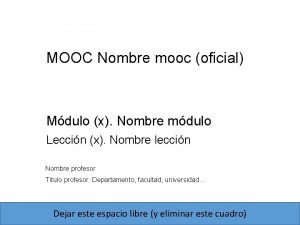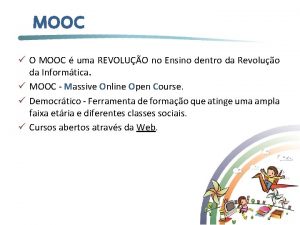Civic Ecology MOOC Community Group Leaders Training 2016















- Slides: 15

Civic Ecology MOOC Community Group Leaders Training 2016

Civic Ecology MOOC team Instructor • Marianne Krasny, Professor, Cornell University Co-Instructors • Keith Tidball, Cornell University • Alex Kudryavtsev, Cornell University • Yue Li, Cornell University • Bryce Du. Bois, Cornell University Course email: civicecology 2016@gmail. com 2

Civic Ecology MOOC Participants • 1800 participants • 35 community leaders 3

Recruit Course Participants Help recruit more participants, share this link with your colleagues: https: //www. edx. org/course/reclaiming-broken-placesintroduction-cornellx-envsci 1500 x-0 4

Course Goals 1. Learn about how people in cities are reclaiming broken places. 2. Learn about cutting edge research to address social and environmental problems. 3. Participate in a civic ecology practice. 5

Course Contents Short lectures, readings, and discussion questions about: • Biophilia (love of non-human life or nature) • Topophilia (love of place) • Social capital and collective efficacy • Nature and human health • Environmental governance • Resilience • And other topics that help us understand community environmental stewardship 6

Final Project • Multi-media description of a civic ecology practice seen through the lens of the 10 civic ecology principles. • We’ll use Storify to develop projects; see instructions: https: //cornellonline. wordpress. com/storify • See projects from the previous course, assembled in a book: https: //civeco. files. wordpress. com/2015/12/krasny_snyder _mooc_stories_2016. pdf 7

Community Groups • So far, we have 30 groups, including local, interest, and bilingual group: https: //cornellonline. wordpress. com/groups • Please use instructions for leaders: https: //cornellonline. wordpress. com/leaders 8

Why do We Have Groups? • Enhance the learning experience for members of your group and for yourself. • Support group members to understand course materials: e. g. , apply them to your context, help with language. • Share resources about civic ecology relevant to your group. • Generate new civic ecology ideas, create new projects and develop real-life collaboration among group members. 9

How to Recruit Group Participants? 1. On the course’s Facebook page (https: //www. facebook. com/groups/1790404347913178), post announcements about your group, including the group’s Facebook URL (or other social media), a short description of your group, introduce yourself, and include a photo to attracts more attention. You can post announcement about your group more than once to invite new people who join the course. 2. On the course’s Facebook page, search people who share your region/country, interest, or language — and invite them personally. 3. Invite your colleagues to join the course, and your group. 10

How to Run a Group? 1. 2. 3. 4. Post at least two weekly posts if you 5. use a Facebook group. Post replies to your group member, click “like” and provide other feedback 6. and comments. Connect your group members with 7. each other when you see that their interests overlap or if there is a potential for collaboration. On Facebook, you can tag group members’ names so that your updates 8. appear in their Notifications. Help group members to come up with collaboration and projects beyond the 9. course Share relevant links, conference announcements, grant programs, and other useful information. Frequently ask group members to share ideas, tell about their programs and relevant experiences. Post photos on your Facebook group (or other social media website); they make discussions more interesting, some people learn ideas better visually. Help group members understand course materials and fulfill course requirements. Help group members to finish the final project (on Storify). 11

Ideas for Discussions 1. 2. 3. 4. 5. 6. Ask participants to restate the course content Ask participants to tell a story about a personal experience that connects with course content Ask participants to apply course content to a problem Ask participants to break concepts down to the components describe them Ask participants to closely critique an idea and evaluate it’s strength Ask participants to come up with a new idea for civic ecology practice Also, help your group members create case studies (the final assignment) on Storify: https: //cornellonline. wordpress. com/storify 12

Certificate Options 1. Achievement Certificate: complete minimum 75% of ed. X assignments. 2. Expert Certificate: complete minimum 75% of ed. X assignments and final project. 3. Cornell community group leader certificate: lead a community group throughout the course will receive. Ø These certificates are free (PDFs delivered via email) Ø An optional “verified” edx certificate costs $49 13

Support • Ask Alex if you have any questions during the course civicecology 2016@gmail. com • https: //cornellonline. wordpress. com/leaders 14

Thank you! • Thank you for being so supportive community group leaders!!! • Please share with us other ideas how to run community groups. Facebook group for community group leaders: https: //www. facebook. com/groups/968682306588661 15
 Civic citizenship
Civic citizenship Difference between civic duties and civic responsibilities
Difference between civic duties and civic responsibilities Mooc ecology
Mooc ecology Ffcla creed
Ffcla creed Ecology
Ecology Population vs community ecology
Population vs community ecology Community ecology
Community ecology Chapter 3 section 1 community ecology
Chapter 3 section 1 community ecology Chapter 54: community ecology answer key
Chapter 54: community ecology answer key Chapter 5 evolution and community ecology
Chapter 5 evolution and community ecology Definition of community ecology
Definition of community ecology Biological disturbance
Biological disturbance Chapter 5 evolution and community ecology
Chapter 5 evolution and community ecology Ecosystems interactions
Ecosystems interactions Community definition ecology
Community definition ecology An organisms rank in a feeding hierarchy
An organisms rank in a feeding hierarchy
